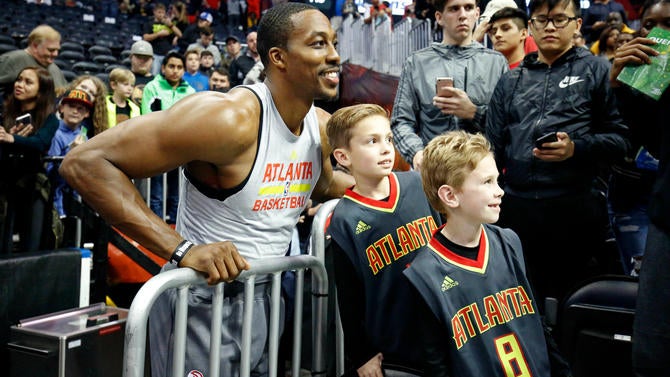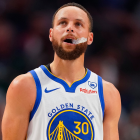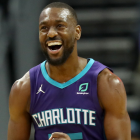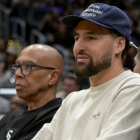The Atlanta Hawks are 12-13, 10th in the East and losers of 11 of their last 14 games. Everybody's worst fears about their remodeled roster appear to have been well-founded -- after an encouraging 9-2 start, they're now 25th in offensive rating, 29th in turnover percentage and 29th in 3-point percentage, a far cry from the well-oiled offensive machine that they were two years ago and in the second half of last season.
In the above video from Reiter Than You, CBS Sports' Bill Reiter points the finger at center Dwight Howard for the Hawks' descent into mediocrity.
"The Dwight Howard nightmare, the nightmare that is believing in this guy's massive and incredible talent went to a new low last night when the Hawks, trying to turn this skid around, trying to get back on track, lost to the lowly Orlando Magic," Reiter said. "I get it, the Magic are a different team, but as you know, Dwight Howard once played for that team, and you would think a sense of pride would try to help him to do whatever it takes to get the win. And, like, here's the thing about Dwight, and it's not just true in Atlanta as, basically, the sky starts to fall on the Hawks and that organization: He has, in his career, certainly from the end of his Orlando tenure until today, at every stop, been a team killer, a chemistry killer, a coach killer to say the least."
Reiter goes on to describe the 31-year-old Howard as a "waste of talent," a "momentum killer" and a "locker room cancer," adding that he "subtracts from the sum of all human joy in every basketball setting that the steps into."

This sort of criticism is nothing new for Howard. He's been ripped for smiling too much and for being standoffish, attacked for not demanding the ball in the post enough and for being selfish. Once one of the faces of the league, his popularity has never been the same since his on-again, off-again trade demands in Orlando in 2011 and 2012.
Going to the Atlanta, though, was supposed to be a new chapter in his career -- this is his hometown team, and it needed to try something different after two straight sweeps at the hands of the Cleveland Cavaliers in the playoffs. If the Hawks could remain one of the East Conference's best teams, perhaps Howard could rebuild his reputation.
Right now, they are nowhere close to one of the best teams in the East, even though they did win two straight games before that loss to the Magic. When they face the scorching Toronto Raptors on Friday, they'll be trying to get revenge for the 44-point beating they were given at the Air Canada Centre a couple of weeks ago.
Is Howard really to blame for all of Atlanta's struggles, though? He's certainly not a perfect fit in coach Mike Budenholzer's offense, but Budenholzer has never had a physical presence like him on the inside.
Defensively, the Hawks are giving up 99.5 points per 100 possessions when Howard is on the floor -- the best defensive team in the league, the Memphis Grizzlies, allow 99.4 points per 100 possessions. When he's on the bench, they give up 104.6 points per 100 possessions -- Howard's former team, the Houston Rockets, give up 104.8 points per 100 possessions and rank 18th in defensive rating. The effect is even more pronounced when it comes to rebounding -- not only is Howard fourth in the league in rebounds per game, he transforms Atlanta on the glass:
| OREB% | DREB% | REB% | |
| Dwight Howard on the court | 29.4 | 78.0 | 53.8 |
| Dwight Howard off the court | 16.4 | 76.3 | 46.7 |
That kind of disparity is absurd, and it illustrates how much the Hawks are relying on him. Defense and rebounding have been two of their strengths this season, and that's the case largely because Howard is on the team.
Perhaps the question to ask here is how much Howard has hurt Atlanta's once-beautiful offense, and that's a difficult thing to calculate. When the Hawks offense is at its best, it was a product of having five players moving in harmony, well aware of each other's tendencies and being willing to move the ball. Throwing a traditional center like Howard in the mix -- and trading away starting point guard Jeff Teague -- was always going to affect that.
Individually, Howard has been just fine in his role for Atlanta, averaging 13.8 points, 12.5 rebounds and 1.6 blocks while shooting a career-high 62.3 percent. Kyle Korver's numbers, however, have more closely resembled his injury-plagued 2015-16 season than his incredible 2014-15 season. Kent Bazemore has underperformed after his breakout year, shooting just 35.3 percent and 28.3 percent from deep. Thabo Sefolosha, Tim Hardaway Jr. and new backup point guard Malcolm Delaney are also shooting poorly from 3-point range.
You could reasonably argue that these guys are the real reasons the Hawks are struggling, or you could argue that the presence of Howard, the "chemistry killer," is ruining their rhythm and dragging them all down. I'd say that Howard is a part of a bigger story -- the slow erosion of what made Atlanta so special two years ago. It's not just that Howard is a bad fit for the offense; it's that Al Horford was a perfect fit. It's not just that Horford left for the Boston Celtics, and it's not just that the front office traded Teague for rookie Taurean Prince, and it's not just that DeMarre Carroll signed with the Raptors in July of 2015 -- it's all of these moves, together, completely changing the identity of the team.
Howard isn't single-handedly killing the Hawks, but the Hawks that you loved a couple years ago are gone. The challenge now is to create something new, with Howard manning the middle on a contract that runs through 2019. Paul Millsap and Korver, the two remaining pieces from the starting five that collectively won Player of the Month, are approaching free agency, and if Atlanta keeps sliding, they'd be crazy not to consider other options. Life comes at you fast.


















